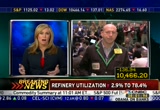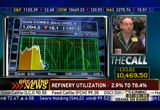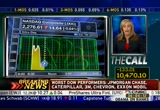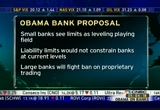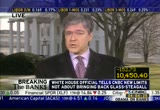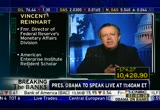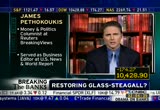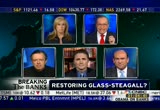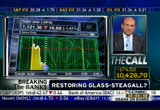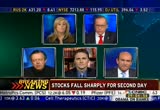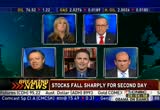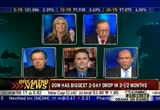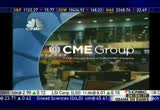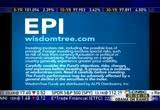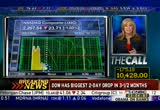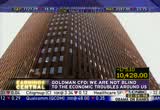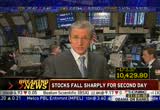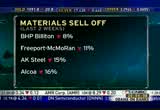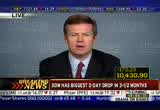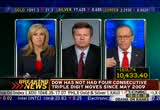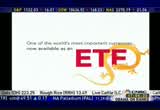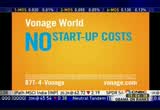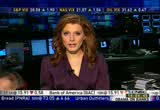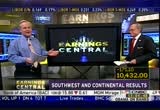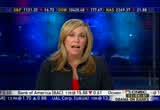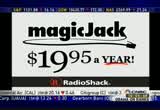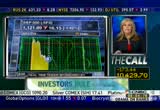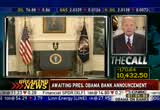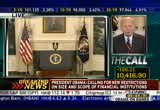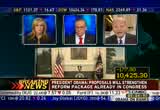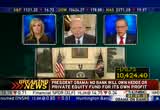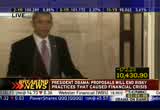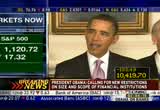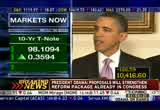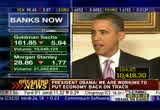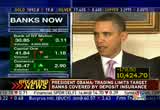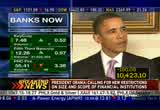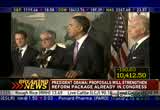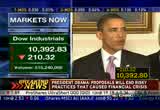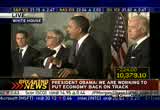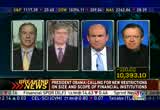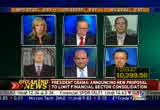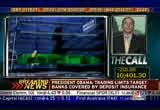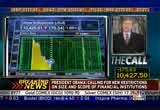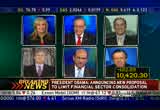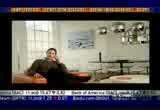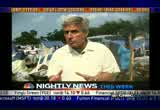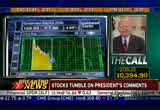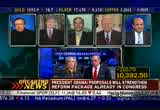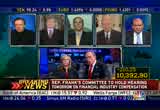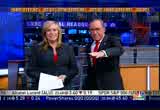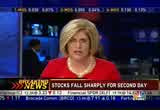tv The Call CNBC January 21, 2010 11:00am-12:00pm EST
11:00 am
with oil with nowhere to go. how serious is a problem is the overhang? how long do you think it would take to burn it off in a recovery? >> that would be a guess on my part, but it's certainly fundamentally hanging over the market. that's why we run into this blizzard of resistance at the $85 level. financial flows may be able to lift it up, but it will take a while. >> if china is tightening monetary policy, as appears to be the case and the federal reserve at some point will follow suit, could that be very bearish for the oil trend? you see the handwritten on the if wall with gold. >> it could be. we focus in on these figures, but the bigger picture has been driven by chinese demand. that could put a damper on the commodity rally and strengthen the dollar as we go to that flight to safety. that could spell a big resistance for commodities.
11:01 am
>> we're going to leave it there, guys. thanks to both of you. lots of news for investors to trade o goldman sachs reporting fourth quarter earnings of nearly $5 billion while setting aside nothing for bonuses in the quarter. for 2009. they said aside $16 billion, but everyone on wall street is awaiting president obama's speech on financial reform. that's one of the reasons why we're seeing the dow down 132 points. they want to know what's in there. that's why we see the big dip. we'll take it live, of course, when that happens. it's trading down by a full percentage point, the dow have been the worst two days since august, remember a dip we saw this time yesterday as well, and a very similar trading pattern, looking at the dow down 1.$133 points, the knack days trading down as well. there it is for you, down about 0.66 of a percentage point, so
11:02 am
tech not getting hit quite as hard. let's check in with john harwood at the white house with more on the president's speech. >> reporter: we have the outlines, melissa. we'll see more at 11:40, but we've always known that financial regulation was going to take a larger part of the washington agenda in 2010, as the congress and the president moved on from the issue that is occupied 2009, and this flows with the wave of concern that average people expressed in massachusetts about washington and about the size of big business and big government. so what you see is the administration trying to identify what it considers a responsible way to limit the size. you have paul volcker having talked for some time, like alan greenspan, about the need to reduce the size of too big to fail institutions, as greenspan says, too big to fail, that means it's too big. they'll allowance limits on the
11:03 am
liabilities that individual institutions can control and try to ban proprietary trading by institutions to the extent that they benefit from the federal deposit guarantee. the ideas if they bet with john and melissa's money, that's fine, and you can lose as much of that as you want, but if you're betting with the federally insured deposits, that is the proxy for systemic risk. >> john, can i just say sometimes you can learn the wrong messages from these elections. scott brown ran against the bank tax, obama went up there sunday and slammed brown on the bank tax and it didn't work. i don't see how any of this stuff will create jobs. i don't see it. they guys may be making, once again, a bad political miscalculation, quite apart from the regulation merits this is a pop -- >> reporter: you know the wall
11:04 am
street better than i do. what are the merits of the actual proposal? you think volcker is wrong? >> we're going to talk about that, john, you're absolutely right. >> thank you, john harwood. let's talk more about obama's crackdown on the financial sector. joining us vincent rinehart, and jimmy, and steve liesman. look, vince, you tell me if i'm wrong, that the original repeal of glass-steagall created a clear firewall so that uninsured deposits could not be used for these trading activities, vince. is that wrong? or is that where the crux of the matter lies? >> i think you're right. we've let financial institutions get too complicated since. we let them splinter their balance sheets, we let them issue complicated securities. as a result, the firms are too
11:05 am
big to be supervised, they are too big and complicated to be disciplined by markets, and they're too big and complicated to be run coherently internally. we've got to fix that, but size isn't the right way to draw the line. >> what's the right way, though? >> what about the firewall issue, though? >> wait, wait. >> i think putting firewalls, putting silos around the activities that would take advantage of the safety net, capitalizing thor lines of businesses independently. >> jim, what i worry about, though, is that when you try and ferret out what's risky and what banks shouldn't be doing, wall street tends to take one step ahead of that in the search for profits. isn't the remedy for failure as painful as that can been? isn't that the only way to correct that. >> we have much matter guys on wall street -- >> with financial motives. >> than working at the regulatory agencies.
11:06 am
that's not what's driving it. this isn't being driven by a hard look at the merits by the economic team. this is being driven completely by the political team at the white house, who's trying to create, one, their own sort of populist way, and they'll going to take pro-wall street votes and that's what's driving it. >> the political genius why is in the white house that have done so good. >> steve. >> this administration has promoting regulatory reform from day one, which is a loser, no matter how you go about it. the idea they're doing regulatory reform for votes is a little silly. >> are you kidding me? listen, they could have put all these ideas in the original regulatory reform bill. >> a lot of them are. >> they thought it was a bad idea. >> some are introduced in the bill. >> is this being driven by larry summers or tim geithner? it's not. >> in the barney frank bill is
11:07 am
$4 trillion, which is essentially a too big to fail bailout. that's all it is. i want to ask you, steve, on the merits, too big to fail is not being dealt with. they're going to put $4 trillion in. secondly, capital requirements is what everybody talked about. third, the issue of the firewall that i mentioned earlier, and last, leverage borrowing ratios. wouldn't all those things make sense than a war against banks and making banks own public utility issues. >> first i congratulate you about knowing about the existence of the firewalls out there. rule 23-a limits the access of the affiliates of the banks to the bank's balance sheet. that is in existence. i'm not sure, by the way, nobody's mentioned this, that the proprietary trading of the banks was any of the source of the -- not clear to me that's exactly an issue. there may be issues which goldman sachs, by the way and
11:08 am
some of their researchers pointed out about the ability of banks to shift risk to the place where it profits them the most. that may be a different issue. i would say the issue of too big to fail is one that i know is being handled through bosul and being -- let me finish this thought -- the administration is not going to get too far in front or let the regulation get too far in front. >> steve makes my point. no one is saying that proprietary trade, and that cause the the whole -- >> they're mad that goldman shorted things they were selling. aren't they mad that goldman shorted things they were selling? >> yeah, but that doesn't create systemic risk. >> no, it doesn't. i agree with you steve 100%. >> the says tomic risk may have been created by the basics themselves. the idea that there is this sort of implicit guarantee of the bank to the trading company, that's where the trading got in trouble there. >> there's a lot of confusion about this firewall and vince, i
11:09 am
want to come back to you, you were down there when this happened. if the firewall's been violated, it must be totally strengthened, but vince, the rest that somehow a government regulatory body will arbitrary decide whether a basic should be broken up or not, how does this help jobs? how does it help economic growth? >> we have a whole lot of issues. if you want banks to make loans and support market activity, now's not the time to raise questions about their longer-term organizational structure nor to put taxes on them. in some sense the administration is working at cross-purposes, but the second issue is there's a lot of public anger there, and you've got to channel it, and so you do have to respond to it. so i think the timing of the announcement lends me to suspect
11:10 am
there's nor politics. >> that was my kernel, when you say we're going to break up the banks that are teague big. how comfortable are you with the rules? or is it arbitrary as larry said? >> i will point out that paul voker has been talking about this, we in fact broken the story i this was it was more than a year ago. that's one. second is my understanding of how it's going to be handled is t kajorrski says it gifts power to limit the scopened -- >> and it says the regulator cuss break them up, and that troubles me. that's more government control. arbitrary government control. >> larry. >> hold on, larry. >> hang on, guy also. you've got to save your excitement. we'll have paul jan korski.
11:11 am
>> i want to lean into this one, because i don't want the government running everything. >> when the government guarantee, the government has a right to limit access -- >> okay, guys, we have to press "pause" on this discussion and squeeze in a break when we come back, we're going to keep this discussion going. everyone stick with us. oh, my goodness. a lot more of this. of course we have the president coming on with the very speech we're talking about. >> i'm really excited about this. >> i think larry has a few questions for. when we come back, full market coverage, plus the huge earnings report. >> yes, indeed, then we'll preview google's earnings with a leading tech analyst. that analyst is going to tell you whether you should buy, sell or hold ahead of its results. you're watching cnbc. we're first in free market business worldwide.
11:14 am
11:15 am
worst two-day drop in about 3 1/2 months. the nasdaq is down better than a percentage point. mary thompson is on the other big stories of the day. we have bob pisani on the stock exchange to fill us in. >> what was unexpected goldman put no money aside for compensation. without that expense, shareholders were rewarded with earnings of $8.20 a share a hefty $3 above expectations. just a moment ago on a conference call with analysts, the ceo noted an improvement -- in the year ahead, the firms concerns include rising and the troubled real estate market. >> since economic growth continues to be the certainle most significant driver, improvement in these macroeconomic factors will be important. >> more than any of its rivals,
11:16 am
goldman has become a lightning rod. earlier, vinier says the decision not to add to the bonus pool shows it's not blind to or deaf to calls for restrangt. it's 20% below 2007 record -- 2007's record numbers, and it's a percentage of risen, well below goldman's historical average. sing vinnier justifying that pay by pointing to the 22.5% return equity generated by the firm. now, with president obama set to call for new rules on banks vinier said it's xwrakt to roll back glass-steagall. he adds that the firm doesn't operate as if the company is too big to fail. let's hit to bob pisani. >> hello, mary.
11:17 am
if you're wondering why is the market down today? look at bank of america here. portfolio managers are preparing positions, and we're still trying to figure out exactly what he's saying, but clearly some kind of restrictions on trading activities for the big banks. bank of america, volume has picked up on the financials, so far today normally would trade about 220, so volume definitely coming in. the other issue, of course, what's going on in china. that's a pretty good number now that chinese officials have to figure out a way to keep the economy going. freeport mac moran is a good example, they've all been weak for the past few days, and maybe the-second half of march -- they did have their earnings, by the way, the good news here metal prices were up, they've been cutting costs, that's good news, but a bit of a concern, they
11:18 am
talked about lower copper and gold production in the year. look how the material stocks have been selling off in the last couple weeks. they hit their highing about two weeks ago. alcoa has not been the same since their earnings came out. we are at 11 a 50 on tuesday. there's a charge this would be. that's a change of maybe 2.3%. that's certainly a move to the down side, but not yet a correction, which melissa, as you know, is about 10%. >> bob, thanks so much. how about goldman sachs' earnings and president obama's much anticipated remarks impact the markets throughout the rest of the day? david kelly, chief market analyst, thanks for joining us. this is the second day in a row we've seen a big dip. what do you think is behind this? >> i think we've had a lot of corrections along the way in this bull market rally, so i think that's part of it, but there also is some concern about the financial sector. if you look at the earnings
11:19 am
season so far, 85% of non-financial companies are beating their estimates, but it's only 50/50 in the financial sector, so still a lot of problems in the financials. >> david, what about the potential government war on banks? >> well, we do need to have some balance here. i mea, there'ses only need for more intelligence reg lace in the long run, but from an economic perspective, one of biggest threats is we don't get enough bank lending, and you need to build bank capital, make banks feel comfortable making risky loans. you need some balance here. we know there are lots of issues which got us into this problem. we're in a situation where people are not doing reckless lending, and i don't think we should be too tight on lending when the economy needs that credit. >> very well put. can we do a quickie, david, the
11:20 am
china monetary and credit tightening, something of a precursor to the fed's own exit strategy. what's your teenage? >> there's a sequence to this thing. china is booming right now, and they are actually quite responsibly trying to prevent a bubble in the real estate market and in their stock markets. there's no reason why a slowdown -- if china is growing 8%, that's not going to stop the world economy from moving forward. i think the federal reserve will keep rates very low, because they want to increase bank capital. that's one of the ways of doing it. >> david, thank you so much for joining us. >> thanks very much. when we come back, times for earnings centering and google ahead of their report. we'll discuss whether to buy or sell the internet giant. >> plus president obama's highly anticipated bank announcement. we'll have full coverage and analysis right here on "the call." we'll be right back.
11:24 am
welcome back to "the call." breaking news, on nbc's late-night shake-up. just this morning they reached a resolution to their issues, releasing a statement just now, saying that they have reached a resolution, and under the terms of the agreement signed this morning, nbc and o'brien will settle their contractual obligations, releasing o'brien from his contract, freeing him to pursue other opportunities after september 1st, 2010. he'll make his final appearance on january 22nd. sources have confirmed that nbc is paying $44 million in total, $32 million to koenen and $12 million to his staff. this is a resolution of a long and ongoing issue, and larry, now back over to you at the earnings central. >> he had better takes that income before tax rates go up. there were other earnings out this morning besides goldman sachs, southwest and continental, i'm joined by the ultimate bottom line tyler matheson here.
11:25 am
>> you could have said a million things and i'm glad you said it the way you did. this morning from southwest, pretty doggone good, and this stock on the big down day is only off about 1%. ten cent a share profit there. the revenues $2.7 billion, basically in line. you can see what they're talking about is a swing from a big loss a year ago in that disastrous fourth quarter of '08. revenue per available seat mile, that's a key metric, up 7%. traffic higher, they're saying that maybe some business travel is coming back, and that that trend has continued into the first part of 2010. >> recovery. >> a recovery, and fuel costs down a little bit. now let's move on to continental which surprised wall street with their profit of three cents a share versus seven cents estimates there. revenue $3.2 billion right on
11:26 am
the button one more time. right now about a 2% drop. again, revenue per available seat mile was down, but that decline on that metric has been narrowing. traffic higher, load factor up, expenses down 9% as fuel costs drop by 32%. so if you were to extrapolate from this, larry, as you correctly say, it is signs of a recovery, perhaps most notably in business expenses. we'll look at more airline earnings next week. they begin with 26 with delta, ual, us airways. >> do you think koenen should take the money -- >> take the money. >> tyler, thanks very much. over to melissa. we ran out of time to talk about google. we want to apologize for that. we'll cover those earnings. the reason we ran out of the
11:27 am
time is paul kanjorski is joining us, and the president is going to speak live. that's moving markets right now. we're going to take you live to the white house for that announcement. ear watching cnbc, first in business worldwide. tdd# 1-800-345-2550 investors got lost in the shuffle. tdd# 1-800-345-2550 investment firms forgot whose money it is. tdd# 1-800-345-2550 enough is enough. tdd# 1-800-345-2550 it's time investors got what they deserve. tdd# 1-800-345-2550 real help that's there when you need it. tdd# 1-800-345-2550 pricing that leaves you with something to actually invest. tdd# 1-800-345-2550 at schwab, we offer a lot more help for a lot less money. tdd# 1-800-345-2550 because at schwab... tdd# 1-800-345-2550 investors rule. tdd# 1-800-345-2550 are you ready to rule?
11:30 am
this is the second day in a row that we've seen a dropped in -- you can see it's down about 1.4%. bob pisani telling us that a lot of this is anticipation of the president's speech. the dow right now is down 175 points. joining us right now from capitol hill is democratic congressman paul jankorski. he wrote an amendment that allows regulators to break up banks than too big to fail. why do you think this is the answer? it will give us a chance to rein in by a limited number of huge
11:31 am
companies, which put our entire system at risk. so this is another methodology of allowing us to have a free market system without subjecting the entire market system to collapse or failure. >> a lot of people up on wall street are worried about this, the idea of dismantling firms, a decision made by regulators if a firm is failing, it could be bankrupt, but dismantling firms about systemic risk, sir, have we ever done anything like this before? >> the only analogy i would have would be antitrust in the attorney general's office when there are mixtures and acsigsz and mergers. larry, if i could send a message today, i would say, let's everybody cool it, this isn't gigantic, the whole question here is really in the implementation of this.
11:32 am
we have some very strong minds that have worked on this, worked with us on it. thinking it through for almost a year. paul volcker, which we all know, he favors this position. we're going to handle it right and i'd like to send the message to the market gut on the there and buy, guys, don't worry about it. >> i think it's the language that people are nervous. it says that even if those firming currently appear to be well capitalized and healthy it would empower regulators to rein in and dismantle firms. that makes markets nervous. it doesn't sound fair, right, doesn't make sense. >> i know, but what it is is there are some situations where companies can get so large, into interconnected, into senior twined, even though they themselves are not at risk, their failure or their involvement in that mechanism can cause the underpinnings of
11:33 am
the entire market. i guess the best example is aig's financial products division over there in london, they got carried away and actually would have brought down a number of our largest banks not only in the united states, but around the world. now when that is seen, we will have a mechanism there for the regulators operating in their council operation to take certain access that would limit that systemic risk failure. i don't anticipate they are going to use this power and dismantle companies, though they do have the power to do that. >> that's kind of the issue. >> we're going to try to provide some good medicine. >> i agree there are a lot of worries and issues around the basicing behavior, sir been and i know we've been a moderate voice.
11:34 am
we had a strategist on a moment ago that said all loans entail a certain amount of risk. through throw a blanket over loans, over jobs are over economic growth. could this thing go too far? >> all i can say is there are no guarantees in life, but if properly and fairly administered, i think it's a tool that will only be helpful to our system and the entire world's economic system. quite frankly from what i've seen in the last year, year and a half, we need a tool like this, or we're on our way to companies that don't care. >> what about the obvious candidates, things like toucher capital requirements, tougher leverage buyer requirements and
11:35 am
let them fail, mr. can joss can i, and those powers will be included in this power with the regulators being able to administer and require those things. >> i'm sorry, representative. we're going to interrupt you for a second and listen into the president. >> ball voelker and bill donaldson. i deeply appreciate the counsel of these two leaders and the board that they have offered as we have dealt with a broad array of difficult over the past two years more than 7 million american have lost their jobs in the deepest recession our generation haus known. every day we are working to put our economy back on track and put america back to work. but even as we dig or way out of this deep hole, it's important
11:36 am
we not lose sight of what led is into this mess in the first place. this began as a financial crisis, when banks and financial institutions took huge reckless risks in pursuit the quick profits and massive bonuses. when the dust settled and this binge of irresponsibility was over, several of the largest and oldest financial institutions were on collapse or were on the verge of doing so. markets plummeted, credit dried up, and jobs were vanishing by the hundreds of thousands each month. we were on the precipice of a second great depression. to avoid this ka lambity, the american people, were forced to rescues financial firm also facing crisis, largely of their own creation. that rescue, undertaken by the previous administration, was deeply offensive, but it was a necessary thing to do, and succeeded in stabilizing the financial system and helping to
11:37 am
avert that depression. since that time, my administration has recovered most of what the federal government provided to banks. last week i proposed a fee to be paid by the largest financial firms in order to recover every last dime. but that's not all we have to do. we have to enact common-sense reforms that will protect american taxpayers and the american economy from future crises as well. for while the financial system is far stronger than a year ago, it's still operating under the same rules that led to its near collapse. these are rules that allowed firms to act contrary to the interests of customers, to conceal their exposure to dead through complex financial dealsings to benefit from taxpayer-insured deposits while making speculative investments, and take on risk sobs vast they posed threats to the entire system. that's why we're seeking reforms, to protect consumers,
11:38 am
we intend to close loopholes that allowed big firm without oversight. to identify systemwise rinks that could cause a meltdown, to strengthen capital and liquidity requirements to make the system more stable and ensure the failure of any large firm does not take the entire economy down with it. never again will the american taxpayer be held hostage by a bank that's too big to fail. limits on the risks major financial firms can take are central to the forms i proposed. and that we're working to pass in the senate under the leadership of chairman chris dodd. as part of these efforts, today i'm proposing two additional reforms that i believe will strengthen the financial system while preventing future crisis. first, we should no longer allow banks to stray too far from
11:39 am
their central mission of serving their customers. in recent years too many financial firms have put taxpayer money at risk by operating hedge fund and private equity funds. these firms have taken thinks risks while benefiting from special financial privileges reserved only for banks. -- and because we learned how dangerous the failure of that system can be during the great depression, but these privileges were not created to bestow banks operating hedge funds or private equity funds with an unfair advantage. when they benefit from the safety net that taxpayers provide, it is not appropriate for them to turn around and use that cheap money to trade for profit. that is especially true when
11:40 am
this kind of trading often puts banks in direct conflict with their customers' interests. the fact is these kind of trading operations can create enormous and costly risks, endangering the entire bank if things go wrong. we simply cannot accept a system in which hedge funds or private equity firms can place huge, risky bets that could pose a conflict of interest. we cannot accept a system in that shareholders make money on thinks operations if the bank wins but taxpayers foot the bill if the bank loses. it's for these reasons i'm proposing a simple and common-sense reform which we're calling the voelker rule after this tall guy behind me. banks will no longer be allowed to own, invest or sponsor hedge funds, private equity funds or proprietary trading operations for their own profit unrelated to serving their customers if they want to trade for profit, that's something they're free to
11:41 am
do, indeed doing so responsibly is a good thing, but these firming should not be allowed to run these funds while ringing a bank backed by the american people in addition, as part of our efforts to protect against future crises, i'm also proposing that we prevent the further consolidation of our financial system. there has long been a deposit cap in place to guard against too much risk being concentrated in a sing the bank. the same principle should applied to larger financial institutions in today's economy. the american people will not be serve -- that's not good for consumers, it's not good for the economy. through this policy, that is an outcome we will avoid. my message to members of congress of both parties is that we have to get this done. my message to leaders in the financial industry is to work with us and not against us on
11:42 am
needed reforms. i welcome constructive input from folks in the financial sector, but what we have seen so far in recent weeks is an army of industry lobbyists to try and block basic and common-sense rules of the road to protect our economy and the american people. if these folks wants a fight, it's a fight i'm ready to have. my resolve is only strengthened when i see a return to old practices. when i see soaring profits and obscene bonuses, from firms that say they can't keep credit card rates low, they can't pay a fee to refund taxpayers for the bailout without passing on the cost to shareholders or customers. that's the claims they're making. it's exactly this kind of irresponsibility that makes clear reform is necessary. we've come through a terrible crisis, the american people have paid a very high price. we simply cannot return to business as usual.
11:43 am
that's why we're going to ensure that wall street pays back the american people for the bailout. that's why we'll rein in the excess and abuse that nearly brought down our financial system. that's why we're going to pass these reforming into law. thank you very much, everybody. >> we're going to take a quick break. the market is really simps. we're going to squeeze in a quick break and come back with our panel and dissect what was just said. this is "the call" wow, that's a low price! wow, that's a low price! how many products do we carry? [ man ] 7,000. wow, that's a low price! i'll get him a cart. hot diggity dog! yeah. that's a low price! [ male announcer ] staples has low prices on everything you need for your office. and we mean everything. staples. that was easy.
11:46 am
welcome back. we had very big news out of the white house just now. the s&p is down almost two percentage points, 20 points, 1117. the dow had been down as much as about 228 points while president obama was speaking. we've bounced back a bit, but still down more than 200 points on the dow as well. the nasdaq is down better than 28 points on the news for president obama. what was new out there saying no basic will own or run a hedge fund or pride equity fund, can't invest in real estate for profit. larry? >> let's just pause and get some analysis on this whole stories as stocks have cratered. howard dean, former chairman of
11:47 am
the democratic national commit aye and john harwood covering the white house, steve liesman is here, vince rinehart is here. what did you hear differently the prohibition on the investment bank and private equity prohibition, this is more punitive? is this a war on bank risk-taking? >> what i didn't hear is how that would exactly help. in fact, banks got in trouble in the old-fashioned way. they made bad loans. another important part of the problem was the underwriting activity that created complicated securities and kept some on its books. that's not about that proprietary trading. what i heard was two important things. it was an invitation to get out of the financial holding company status. that's, get out of the embrace of the government if you're somebody like goldman sachs.
11:48 am
>> goldman specifically said today in their earnings conference call, let me address this to steve liesman who covers this, too. they said they are not getting out of the bank holding company business. this could be a deathblow to goldman sachs, from what i heard, superficially from the president. steve, your comment. >> i will say this is very new, we haven't heard it. the question is in the execution, larry. does it mean the bank holding company cannot sumly own it? or is it the bank itself that owns it? my guess is the way the structures work, if that's the case there would be very little change. >> the safety note you're talking about the banks nose the holding company. >> this goes back to the firewall issue. howard dean, you have a thought?
11:49 am
>>. >> it seems that the president took a half step back toward glass-steagall without actually saying that. as always in washington, it depends on the details. what is clear is you can't use deposits insured by the fdic to fund more risky ventures than plain vanilla loans. >> i thought you already weren't supposed to that. >> only 10% of the bank can be loaned to an affiliate. >> i would assume that would go to zero based on what the president says. john, this is one of these things, there's a lot in the air, stocks createred during the speech. stocks are coming back a little, john. is there a fact sheet, john? some details that we can all get our arms around? >> i would start by confessing
11:50 am
that if steve liesman is confused, i'm even more confused. i don't know how mechanically this will work. we have to have time to look it over. >> i thought the rule under 23 ha was you couldn't use deposits. you could use profits from the bank for these other things, but that's what the firewall was all about. >> from the holding company. >> it's a limitation of the access of any affiliate of the bank, and it limits it to 10% of the capital. >> so the key here, i think, larry's bewilderment is key. i don't think they have figured out the execute necessary of the policy goals yesterday. >> is this just plain order nair populist bank attack, let's punish the bank. >> the answer is yes. >> is the sheer raw left-wing
11:51 am
populist politics? >> maybe yes on the hedge fund issue, but no on the firewall issue. >> no. >> no. >> let me finish. >> larry, you think that paul volcker is a crazy populist? >> we have to take a quick brain, hang on, hold your answers. >> somebody has to keep order here, larry. in this unusually volatile time, you want a financial partner... who is unusually prepared to help. the meeting with northern trust went well, didn't it? yeah, they get it. they really get it. a little more stability would be nice. northern trust offers the strength and expertise... that can only come from a 120-year track record... of thriving even in difficult times. they understand. roller coasters are for kids, not money. ♪ northern trust. wealth management.
11:52 am
asset management. asset servicing. someday, the driver will get to choose how efficient or powerful their car will be. the first ever hs hybrid. only from lexus. the most fuel-efficient of all luxury vehicles. lets you talk and surf the web at the same time. verizon's doesn't. [ cellphone rings ] excuse me. yeah. hey, rick. what, you're on a game show right now?
11:53 am
what's the capital of peru? [ rick ] come on, man, hurry. you got to help me. [ luke ] that would be lima. [ rick ] my answer is lima. [ man ] you just won a million dollars! okay, now, i-i better get a cut of that. [ male announcer ] when you compare, there's no comparison. at&t. a better 3g experience. get an exclusive pantech messaging phone free after mail-in rebate. only from at&t. because with national, i roll past the counter... and choose any car in the aisle. choosing your own car? now, that's a good call. go national. go like a pro.
11:54 am
all right. welcome back to "the call." we have our panel and congressman paul jankorski has come back. we heard some things that we weren't expecting, bank stocks are tanking. what do you think? >> that's natural. i think there's a shock and misunderstanding. i would say let everybody settle down, and i heard a couple suggestions by the panel. they should reduce those to one-page memos and make sure the representatives and senators that are on the per spect tiff financial get memos on that. we can make corrections to make sure that horrendous things don't happen.
11:55 am
>> vince, as a former bigwig at the federal reserve, what's your take on given them regulatory authority to shut down trading activities, including the hedge funds and private equities, arbitrary decisions by the fed. do you have confidence that the federal reserve could do such a thing? >> so you have to ask the question, maybe you have confidence in this federal reserve board. will you have confidence in the board in five years? ten years? 15 years? what will that do to innovation? >> this is the same group that couldn't shoot straight during the crisis. >> right. so i think there's questions about innovation. i do, however, believe we have some responsibility to limit risk. we shouldn't let institutions do things that create large systemic risks.
11:56 am
>> you heard congressman saying he would like a one-page memo on what to do? >> i think we would all like a one-page memo. one is the problem of using depositors' money to take risk. this would not have solved the aig problem. that didn't take deposits. they were guilty of some of the grossest behavior, and the much tougher problem is how to deal with big companies that don't take deposits and take risk toss bring down the whole financial system. >> howard, that is a great point. i know, john, you want to get in. i still come back to this issue of fire walls. the way the glass-steagall reform bill was done is they cannot use, you want to information this legally, with the penalty of going to jail, they cannot use insured deposits in any way to go through the
11:57 am
firewall and finance this is more exotic organizations. that's the law, john, why don't we just implement the law? >> well, iffed risky activities that you are describing with tax pay subsidies can be prohibited, that's a very good question that you're raising. you would have to talk to steve or vince or somebody with more expertise than me, but the only point i would make is you talked about the fed not shooting straight in the last crisis, and certainly the fed didn't and regulators didn't and much of congress did not, but you're not thinking it's only washington that shouldn't shoot straight, are you thinking there were some mistakes made? >> without question. >> but the point is regulations sometimes can backfire. >> unfortunately we're out time. they're not going to let us keep going. that's it. >> we'll continue this
11:58 am
conversation on the "power lunch" coming up and on "the cud lo report." join us then. here's "power." we will absolutely continue the discussion that was just taking place there on the call. welcome to "power lunch." i'm tyler matheson on this extraordinary day in the business of banks. i'm here with see herrera, julia boorstin, dennis kneale, and stocks are tanks, and the president's remarks on tapping into voter anger about the struggling economy. high unemployment, tack pair bailouts, surging bank deposits. >> and i reaction, we'll check out the financials, all in the red, significance percentage losses in bank of america. the president unveiling those new rules to reduce excessive risk-taking by the nation's
11:59 am
biggest banks, to limit proprietary trading as well, julia. >> fear and uncertainly about the economy, china and the financialing are gripping investors. >> and it just keeps on giving. stocks plunging for the second day in a row. let's gather our cnbc all-stars, bob, why don't you start us off? >> i think the important thing is the dollar dropped rather dramatically 15, 20 minutes ago. a lot of people are arguing the dollar should be weaker after that kind of speech. take a look at some of the bank stocks, going 225 million shares, already. we haven't seen that kind of volume in a long time. morgan stanley has also had very heavy volume here today. most of these stocks have gone nowhere, starting to pick up a bit. goldman sachs, same situation. now, while
220 Views
IN COLLECTIONS
CNBC Television Archive
Television Archive  Television Archive News Search Service
Television Archive News Search Service 
Uploaded by TV Archive on

 Live Music Archive
Live Music Archive Librivox Free Audio
Librivox Free Audio Metropolitan Museum
Metropolitan Museum Cleveland Museum of Art
Cleveland Museum of Art Internet Arcade
Internet Arcade Console Living Room
Console Living Room Books to Borrow
Books to Borrow Open Library
Open Library TV News
TV News Understanding 9/11
Understanding 9/11